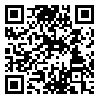شنبه 2 اسفند 1404
[Archive]
دوره 9، شماره 3 - ( 4-1400 )
جلد 9 شماره 3 صفحات 257-247 |
برگشت به فهرست نسخه ها
Download citation:
BibTeX | RIS | EndNote | Medlars | ProCite | Reference Manager | RefWorks
Send citation to:



BibTeX | RIS | EndNote | Medlars | ProCite | Reference Manager | RefWorks
Send citation to:
Alasty H, Hasani J, Akbari M, Mohammadkhani S. Psychometric Properties of the Eating Beliefs Questionnaire (EBQ-18) in A Nonclinical Iranian Sample: A Transdiagnostic Measure. PCP 2021; 9 (3) :247-257
URL: http://jpcp.uswr.ac.ir/article-1-759-fa.html
URL: http://jpcp.uswr.ac.ir/article-1-759-fa.html
Psychometric Properties of the Eating Beliefs Questionnaire (EBQ-18) in A Nonclinical Iranian Sample: A Transdiagnostic Measure. Practice in Clinical Psychology. 1400; 9 (3) :247-257
چکیده: (5271 مشاهده)
Objective: Binge eating is a transdiagnostic construct and one of the main components of eating and emotional disorders. Meta-cognitive beliefs about eating play an important role in the maintenance of binge eating. The Eating Beliefs Questionnaire (EBQ-18) is a self-report questionnaire, which measures negative, positive, and permissive beliefs about binge eating. This cross-sectional study aims to assess the psychometric properties of the EBQ-18 in a community sample.
Methods: A total of 501 participants (413=females, 88=males) were selected through multi-stage cluster sampling and were administered the EBQ-18, the Binge Eating Scale (BES), the Dutch Eating Behavior Questionnaire (DEBQ), the Body Image Concern Inventory (BICI), the Acceptance and Action Questionnaire (AAQ-II), and the Intolerance of Uncertainty Scale (UIS). Construct validity, internal consistency, convergent and divergent validity of the EBQ-18 were determined using Exploratory Factor Analysis, Confirmatory Factor Analysis.
Results: The EBQ-18 possesses a three-factor structure and a high internal consistency (α=.91). The EBQ-18 showed convergent validity with the BES and the DEBQ, divergent validity with the BICI, AAQ-II, and The UIS.
Conclusion: The goodness-of-fit indices were acceptable and the data showed adequate fit to the three-factor model. In conclusion, findings provide initial support for the validity and reliability of the EBQ-18.
Methods: A total of 501 participants (413=females, 88=males) were selected through multi-stage cluster sampling and were administered the EBQ-18, the Binge Eating Scale (BES), the Dutch Eating Behavior Questionnaire (DEBQ), the Body Image Concern Inventory (BICI), the Acceptance and Action Questionnaire (AAQ-II), and the Intolerance of Uncertainty Scale (UIS). Construct validity, internal consistency, convergent and divergent validity of the EBQ-18 were determined using Exploratory Factor Analysis, Confirmatory Factor Analysis.
Results: The EBQ-18 possesses a three-factor structure and a high internal consistency (α=.91). The EBQ-18 showed convergent validity with the BES and the DEBQ, divergent validity with the BICI, AAQ-II, and The UIS.
Conclusion: The goodness-of-fit indices were acceptable and the data showed adequate fit to the three-factor model. In conclusion, findings provide initial support for the validity and reliability of the EBQ-18.
| بازنشر اطلاعات | |
 |
این مقاله تحت شرایط Creative Commons Attribution-NonCommercial 4.0 International License قابل بازنشر است. |



